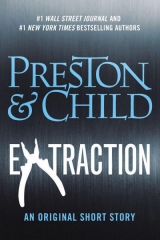
Текст книги "Extraction"
Автор книги: Lincoln Child
Соавторы: Douglas Preston
Жанр:
Триллеры
сообщить о нарушении
Текущая страница: 2 (всего у книги 2 страниц)
“We took a step inside. The interior of the house was pitch black. As my father was feeling along the wall, unsuccessfully, to find the switch of an electric light, a gust of wind grabbed the front door and slammed it behind us. I jumped at the crash, and stood in the darkness, trembling, as the echoes came back at us from the deep interior spaces of the house.
“ ‘Aloysius,’ I heard my father say out of perfect darkness, ‘hand me up that lantern.’
“I marveled at the coolness, the levelness, of his tone. I raised the lamp up over my head. It was taken by an unseen hand. For a moment, there was silence. Then the scritchof a match, followed by a flicker of yellow from the lantern. There was a squeaking sound as my father adjusted the wick, and the light brightened until we could… we could see the room around us.”
Pendergast took a sip of brandy, and another, before placing the glass aside again. “We were standing in the formal entryway of the house. The lantern, though dim, furnished enough light for us to make out – just barely – the details around us. At first it didn’t look like anything much out of the ordinary, a typical antebellum mansion of the Delta style. To the left was an open set of double doors, leading into the main parlor; to the right, another set of open doors gave onto the dining room. Ahead, a large staircase swept up in a gracefully rising curve, and below it a hallway led back out of the range of our vision.”
Pendergast took a deep breath, let it out slowly.
“Gradually, the dimly lit room came into focus to my eyes and its shabbiness became more apparent. The floor was covered with a Persian rug, threadbare and chewed by mice. The pictures on the wall were so dark with age as to be indecipherable. A section of banister was gone on the stairway, and several desiccated plants stood in containers on either side of the staircase. But then I began to notice something else – something very odd. The surfaces of the room – the walls, the furniture – did not seem quite as regular and flatas they should. It was as if they had… density and texture. As my father proceeded cautiously into the center of the room, the lantern extended, I noted myriad tiny gleams and sparkles from the wallpaper and elsewhere, which formed elaborate patterns of curlicues and lines. I stared, unable to comprehend what was causing this strange effect.
“My father realized it before I did. I heard a choked gasp from him, and he stopped dead, extending the lantern toward one particularly complex pattern of wallpaper.
“That was when I realized the designs were not part of the wallpaper itself. They were from tiny, gleaming things affixed to the wall. As I stared, my father took a single step forward and I realized what these little gleaming things were.
“They were teeth. Tiny, white, polished teeth. I could not speak, and nor could my father. But with that realization came a second one – these curlicue patterns were everywhere. They ran along the molding, they coiled about the wainscoting, and they looped and spiraled about the door frames. They marched in lines up the banister; they decorated the gilt edges of the paintings hung on the walls. Teeth… everywhere I looked, little incisors and bicuspids looked back at me. Swirls of youthful molars followed the contours of the room in dotted lines, meticulously arranged, achingly regular. Sometimes their biting ends were affixed to the walls, curved roots sticking up in sickening curves; other times they were reversed, the rows of yellow and white bone lined up as if ready to nibble the air. There were whorls and spirals, like the cowrie-shell necklaces of the South Seas, and delicate sprays like bursting fireworks arrested in midair. There were other, denser designs, like leering faces with slit-like eyes and yawning mouths, which seemed to be screaming out at us from the walls.
“My father said nothing. I believe his silence was more unnerving to me than if he had cried out in disgust. He slowly walked up to the closest wall and held up the lantern, moving it back and forth. The moving light threw countless tiny, sharp shadows across the surfaces, like some nightmarish magic-lantern show. The… the precision, if you will, the fanatical craftsmanship, was diabolical.
“Despite my shock, and despite being almost dazed with fear, there was still a small part of my brain that – as I stared around, wide-eyed, in the glow of the lantern – could not help but wonder how long this had been going on; how many children over how many years had contributed their teeth to this dreadful work? Old Dufour must have been very, very old indeed to have accumulated so many teeth.
“My father, with excruciating slowness, walked the length of the four walls in that room, his lantern extended, peering at the tooth-work. Why he felt the need to see it all, to examine it, I do not know. It was all I could do not to shut my own eyes against the abominable sight.
“Without conscious thought, I was somehow walking backward in my horror, and I lost my footing; my hand went back instinctively to keep myself upright. It touched the wall… and I received a dreadful sensation of cold, hard unevenness. With a cry, I yanked my hand away from the sharp nubbins of teeth, almost as if I had burned it, and once again stumbled forward, gasping with fear.”
Pendergast stopped. His breathing, which had accelerated during this last recitation, eventually slowed again. In time, he continued.
“My father turned to me, and I saw a strange, hollow look in his face. ‘Go outside to the street,’ he said. ‘I must search for Everett.’
“But I didn’t obey. I was terrified to leave him. As he turned to pass through a doorway in the back of the room, I followed at a sudden run. He ignored me, continuing along a dark passageway, his revolver at the ready. We came to a kitchen, all tile and marble surfaces, but there was nothing here beyond rat droppings and mold. The shabby living room, the sofas and chairs burrowed into by rodents, likewise showed no sign of either my uncle or Maurus Dufour.
“But in the very back of the house, in a small room that opened to what once was a garden, we found… a workshop. There was a dentist’s chair there, an antique from the late nineteenth century, of darkened wood, cracked leather, and polished brass, the seat gnawed by rats, the stuffing protruding. On an old brass steel tray beside it, we found an array of rusty dental instruments with bone handles.
“And there, arrayed with military precision on the tray, we saw something else. Teeth. Thirty-two of them. But these were not baby teeth – oh, no. They were all adult. And they were damp, their roots bloody, some pulled out so violently that sections of the surrounding bone were still attached. They had all been freshly extracted.”
“Freshly extracted,” Constance repeated in a dull voice, and then quoted: “ ‘I appeasedhim.’ ”
“Everett was always so precise in his speech. Indeed he did appeaseOld Dufour. And what a ghastly exchange it must have been.”
“And what happened to him?”
“We never saw Uncle Everett again. The police searched the place, and searched again. Both Dufour and my uncle had disappeared, as if into thin air. There were those who spoke of hearing cries in the night; of seeing a dark figure lugging a trunk down by the abandoned Saint Peter Street Piers – but, of course, such stories remained rumors.”
“And the, ah, leaving of teeth at the Dufour house? Has the tooth fairy tradition continued?”
“You know how children are, my dear Constance. Childish rituals do not die; they are passed along more tenaciously than any adult tradition. The tradition continued even as the Dufour house fell further into rack and ruin. And then, one dark night, it burned down. That was about three years after the events I’ve described. No one was particularly surprised by it; abandoned houses did have a tendency to burn. But I, for one, long wondered if my brother Diogenes was somehow responsible. Later, it came to my attention that he enjoyed fires very much; the larger the better.”
The plump figure of Mrs. Trask appeared in the library doorway. Cook, she was pleased to announce, had prepared a new dish of tagliatelle pasta; dinner was ready; and the tartufo biancowas no less than heavenly. Indeed, the wonderful aroma of it had filled the kitchen and was now drifting into the library.
“And is the pasta al dente?” Constance asked.
“Perfectly so,” replied Mrs. Trask.
Bertin came up behind the housekeeper. As Pendergast had predicted, the old man’s mood was restored. “Marvelous, I simply cannot wait!” he said, rubbing his hands. “Have you ever scented such exquisite truffes? Please, let us go in without delay.”
Pendergast rose and glanced at Constance. “Shall we?”
“Al dente,” Constance repeated to herself. “Yes, one must eat one’s pasta al dente. Somehow, Aloysius, I find that your story has sharpened my appetite to a most excellent degree.”
And with that observation, the three went in to dinner.
About the Authors
The thrillers of Douglas Preston and Lincoln Child “stand head and shoulders above their rivals” ( Publishers Weekly). Preston and Child’s Relicand The Cabinet of Curiositieswere chosen by readers in a National Public Radio poll as being among the one hundred greatest thrillers ever written, and Relicwas made into a number-one box office hit movie. Coauthors of the famed Pendergast series, Preston and Child are also the authors of Fever Dream, Cold Vengeance, and Gideon’s Sword. Preston’s acclaimed nonfiction book, The Monster of Florence, is being made into a movie starring George Clooney. His interests include horses, scuba diving, skiing, mountain climbing, and exploring the Maine coast in an old lobster boat. Lincoln Child is a former book editor who has published five novels of his own, including the huge bestseller Deep Storm. He is passionate about motorcycles, sports cars, exotic parrots, and nineteenth-century English literature.
Readers can sign up for The Pendergast File, a monthly “strangely entertaining note” from the authors, at their website, www.prestonchild.com. The authors welcome visitors to their alarmingly active Facebook page, where they post regularly.








